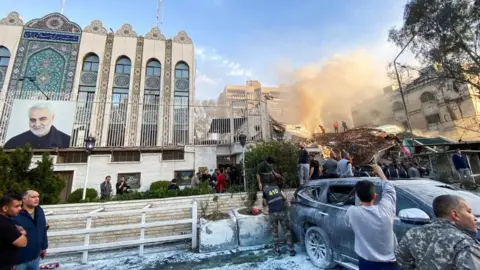US President Joe Biden says he expects Iran to attack Israel “sooner than later”, as fears grow of Iranian retaliation over an air strike that killed top commanders early this month.
Israel has not admitted attacking an Iranian consulate in Syria but is widely believed to have been behind it.
US officials have told CBS News, the BBC’s US partner, that a major attack on Israel could happen imminently.
Israel says it is ready to defend itself. Mr Biden told Iran : “Don’t.”
“We are devoted to the defence of Israel. We will support Israel,” Mr Biden said. “We will help defend Israel and Iran will not succeed.”
Iran backs Hamas, the Palestinian group fighting Israel in Gaza, as well as various proxy groups throughout the region, including some – such as Hezbollah in Lebanon – that frequently carry out strikes against the Israelis.
On Friday, Hezbollah said it had launched “dozens” of rockets from Lebanon towards Israel. An Israel Defense Forces (IDF) spokesman said around 40 missiles and two explosive drones had been launched. No casualties were reported and there were no indications of involvement from other actors.
A US official told CBS the barrage was separate from any expected Iranian attack on Israel.
BBC Security Correspondent Frank Gardner says Iran is deliberately keeping the Middle East and Washington guessing.
Ever since the lethal 1 April strike on the consulate building in Damascus, from which Israel believes Iran was directing its covert arms supplies to Iranian proxies in Lebanon and Syria, Iran’s security establishment has been debating its response.
This is all about calibration. Hit too hard and Israel will respond with devastating force. Go too lightly and Iran will risk being seen as weak and ineffective. From a tactical perspective, it makes no sense for Iran to respond right now, when the region is on full alert and when the US has been telling the world what to expect.
Pragmatists in Tehran and Qom will be urging restraint, while hawks, including the ageing Supreme Leader, Ayatollah Khamenei, will be demanding a firm response.
But Iran does not want a full-scale war, nor do its neighbours on the Arab side of the Gulf. Governments there have already asked Iran for restraint. The question now, our correspondent says, is whether it is the hawks or the doves who prevail.
The mounting tensions have led countries including the US, UK, India and Australia to warn against travel to Israel. Germany called on its citizens to leave Iran.
The US state department also barred diplomatic staff and their families in Israel from travelling outside the cities of Tel Aviv, Jerusalem and Beersheba.
Israeli Prime Minister Benjamin Netanyahu has met members of his war cabinet amid the warnings.
Some Israelis said they were not worried about a potential Iranian attack.
“We know that we are surrounded by enemies, in the south, in the north, the east and the west,” Daniel Kosman told AFP news agency at a market in Jerusalem. “We are not afraid, I can promise you. Look around: people are going out.”
 Reuters/Israel has not claimed responsibility for the strike in Damascus but is widely considered to have carried it out
Reuters/Israel has not claimed responsibility for the strike in Damascus but is widely considered to have carried it out
The Israeli government has not issued any new advice to its people on top of existing guidance to stock up on water, food for three days and essential medicine.
Israeli radio, however, reported local authorities had been told to prepare for the possibility of an attack, including by assessing the readiness of public shelters.
Last week, the Israeli military cancelled home leave for combat troops, bolstered air defences and called up reservists.
Thirteen people were killed in the 1 April missile strike on the Iranian consulate in Damascus.
They included senior Iranian military leaders, among them Brig Gen Mohammad Reza Zahedi, a senior commander of Iran’s elite Quds Force in Syria and Lebanon.
Israel has not commented but is widely considered to have carried out the attack.
Officials in several countries have been trying to dissuade Iran from launching an attack, fearing it could spark a wider regional war.
US Secretary of State Antony Blinken has spoken to the foreign ministers of China, Saudi Arabia and Turkey in an attempt to convince them to use their influence with Iran.
After meeting the commander of US Central Command on Friday, Israeli Defence Minister Yoav Gallant said the bond between the two countries had been strengthened by the threat, adding “we will know how to respond”.
The war in Gaza was sparked when Hamas attacked Israeli communities near the Gaza Strip, killing about 1,200 people, most of them civilians, and taking more than 250 hostage. Israel says that of 130 hostages still in Gaza, at least 34 are dead.
More than 33,600 Gazans, the majority of them civilians, have been killed during Israel’s campaign in Gaza, the Hamas-run health ministry says.
The conflict has also seen Israel trade almost daily fire across its northern border with Hezbollah, while Iran-backed groups in Iraq and Yemen have attempted to hit Israeli territory as well as US bases in Iraq and Syria.
Yemen’s Houthi movement has also attacked shipping in the Red Sea, sinking at least one ship and prompting the US and UK to conduct air strikes on Houthi targets in Yemen.
MORE:

